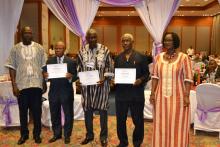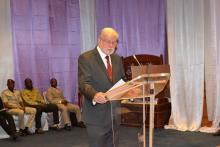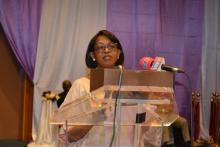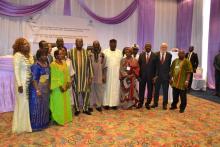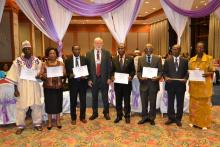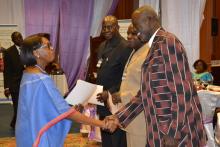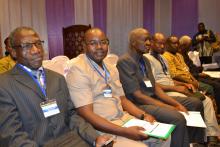WHO celebrates more than 40 years of success in the control of onchocerciasis or "river blindness"
Ouagadougou, 15 July 2016 – WHO celebrates, from 14 to 15 July 2016, more than 40 years of success in the control of onchocerciasis or "river blindness", a parasitic disease whose vector is an insect that reproduces itself in water. The event was launched yesterday morning, at Laïco hotel, Ouagadougou, by the Head of State of Burkina Faso, President Roch Marc Christian Kaboré, in presence of the WHO Regional Director for Africa, Dr Matshidiso Moeti, several African health ministers (Benin, Burkina Faso, Central African Republic, Chad, Sierra Leone and Uganda), Partners, representatives of nongovernmental organizations and former OCP and APOC staff.
It is worth recalling that the Onchocerciasis Control Programme in West Africa (OPC) was founded and established in Ouagadougou, Burkina Faso, in 1974, involving seven countries (Benin, Burkina Faso, Côte d’Ivoire, Ghana, Mali, Niger and Togo); it expanded and was replaced, in 1995, by the African Programme for Onchocerciasis Control (APOC), still based in Ouagadougou, but involving other countries affected by the disease in Central and West Africa, which increased the number to a total of 31 countries. The African Programme for Onchocerciasis Control closed in December 2015.
Taking the floor at the opening ceremony, the WHO Regional Director for Africa, Dr Matshidiso Moeti, says "these two programmes have contributed significantly in reducing the devastating effects of onchocerciasis in countries in the African Region, through many years of intense efforts that enabled to overcome unimaginable challenges and constraints”.
In terms of achievements, more than 600 000 cases of blindness were avoided; one billion treatments administered to protect more than 190 000 communities across Africa; 18 million children born, with no risk of becoming blind, in areas freed from onchocerciasis. Countries including Malawi and Niger are close to elimination of diseases such as onchocerciasis and lymphatic filariasis. One major fact worth mentioning is the “liberation” of 25 million hectares of fertile land for the benefit of communities hitherto affected by the disease. Equally, a public health innovation was made, notably the community-directed treatment with invermectin (CDTI) strategy, invermectin being the medicine used for treatment of river blindness. This strategy is cited in health economics as one of the most cost-effective methods.
Despite the significant progress made, onchocerciasis, one of the 17 neglected tropical diseases (NTDs) has not been completely defeated on the continent. The President of Burkina Faso, Mr Roch Marc Christian Kaboré, in his opening speech says: “Today, more than ever before, we count on WHO coordination, collaboration with health partners, commitment to and ownership of disease control by our governments and participation of communities to ensure the success of the Expanded Special Project for Elimination of Neglected Tropical Diseases (ESPEN)". The Project began in January 2016 and was officially launched in Geneva, Switzerland, on 23 May 2016.
Beyond celebrating achievements in onchocerciasis control, the two-day meeting in Ouagadougou aims, among others, to provide an update of the situation, examine factors hindering elimination of onchocerciasis and other diseases that could be conquered through mass distribution of medicines for prevention in the WHO African Region. It also aims to pave the way for elimination of neglected tropical diseases through implementation of ESPEN.
In the afternoon, the WHO Regional Director for Africa, Dr Matshidiso Moeti, paid a courtesy visit to the Head of State to thank the national authorities for all the facilities provided to OCP and APOC while serving in Burkina Faso. A gala evening was organized yesterday to acknowledge and give due credit to the staff and partners who contributed to the success of OAC/APOC and onchocerciasis control on the continent.
________________________________
Note to editors: What is ESPEN?
Close to one billion people worldwide suffer from neglected tropical diseases, 40% of who live in the WHO African Region alone. ESPEN aims to help affected countries reduce the burden of NTDs.
Officially launched in Geneva, Switzerland, on 23 May 2016, during a side event at the 69th session of the World Health Assembly, ESPEN is hosted by the WHO Regional Office for Africa, in Brazzaville, Congo. It is a five-year programme aimed at the control of five neglected tropical diseases that could be conquered through mass distribution of medicines for prevention, notably lymphatic filariasis or elephantiasis, onchocerciasis, schistosomiasis, intestinal worms and blinding trachoma.
USAID, Bill and Melinda Gates Foundation, Kuwait Fund, End Fund, Merck and British cooperation, through DFID have until this juncture provided ESPEN financial support.
________________________________
For further information, please contact:
Technical contact
Dr Benido Impouma
Regional Adviser
Neglected Tropical Diseases/Disease Prevention and Control Cluster
WHO Regional Office for Africa
Brazzaville, Congo
Tel: +4724139773
Mob: +242065081127
Email: impoumab [at] who.int (impoumab[at]who[dot]int)
Media contacts
Crépin Hilaire DADJO
Communication officer
WHO/IST West Africa – Ouagadougou/Burkina Faso
Tel. : + 226 76 49 67 13
Email: dadjoh [at] who.int (dadjoh[at]who[dot]int)
Rodrigue BARRY
Communication officer/advocacy
WHO/IST West Africa – Ouagadougou/Burkina Faso
Tel. : +22 70 21 43 12
Email: barryr [at] who.int (barryr[at]who[dot]int)
Collins BOAKYE-AGYEMANG
Regional communication adviser
WHO Regional Office for Africa – Brazzaville, Congo
Tel: + 47 241 39420
E-mail: boakyeagyemangc [at] who.int (boakyeagyemangc[at]who[dot]int)





